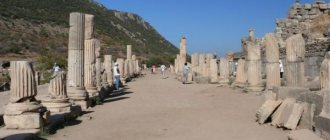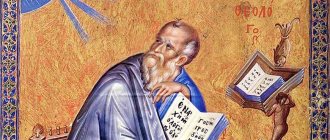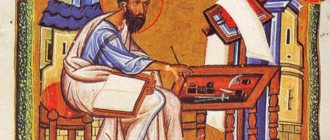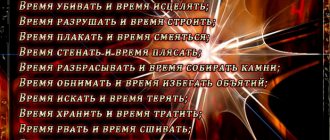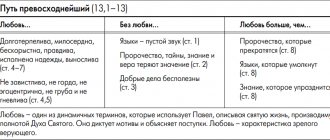Online reading of the book Bible Epistle to the Romans by St. Apostle Paul
Chapter 8
1There is now therefore no condemnation for those who are in Christ Jesus, who walk not according to the flesh, but according to the Spirit,
2 because the law of the Spirit of life in Christ Jesus has set me free from the law of sin and death.
3 Because the law, weakened by the flesh, had no power, God sent His Son in the likeness of sinful flesh for sin and condemned sin in the flesh,
4 that the righteousness of the law might be fulfilled in us, who walk not according to the flesh, but according to the Spirit.
5 For those who live according to the flesh set their minds on carnal things, but those who live according to the Spirit set their minds on spiritual things.
6 To be carnally minded is death, but to be spiritually minded is life and peace,
7 because the carnal mind is enmity against God; for they do not obey the law of God, and indeed cannot.
8 Therefore those who live according to the flesh cannot please God.
9 But you do not live according to the flesh, but according to the Spirit, if only the Spirit of God dwells in you. If anyone does not have the Spirit of Christ, he is not His.
10 And if Christ is in you, the body is dead because of sin, but the spirit is alive because of righteousness.
11 If the Spirit of Him who raised Jesus from the dead dwells in you, He who raised Christ from the dead will also give life to your mortal bodies through His Spirit who dwells in you.
12 Therefore, brethren, we are not debtors to the flesh, to live according to the flesh;
13 For if you live according to the flesh, you will die, but if by the Spirit you put to death the deeds of the flesh, you will live.
14 For as many as are led by the Spirit of God, these are sons of God.
15 Because you did not receive the spirit of slavery [to] live again in fear, but you received the Spirit of adoption as sons, by whom we cry: “Abba, Father!”
16 This very Spirit bears witness with our spirit that we are children of God.
17 And if children, then heirs, heirs of God, and joint heirs with Christ, if only we suffer with Him, so that we may also be glorified with Him.
18 For I consider that the sufferings of this present time are not worth comparing with the glory that will be revealed in us.
19 For the creation waits with hope for the revelation of the sons of God,
20 For the creation was subjected to vanity, not voluntarily, but by the will of him who subjected it, in hope,
21 that the creation itself will be freed from the bondage of corruption into the freedom of the glory of the children of God.
22 For we know that the whole creation groans and suffers together until now;
23 and not only [she], but we ourselves, having the firstfruits of the Spirit, and we groan within ourselves, waiting for adoption as sons, the redemption of our body.
24 For we are saved in hope. But hope, when it sees, is not hope; for if anyone sees, what can he hope for?
25 But when we hope for what we do not see, then we wait with patience.
26 Likewise the Spirit also helps us in our weaknesses; for we do not know what to pray for as we should, but the Spirit Himself intercedes for us with groanings that cannot be expressed.
27 But he who searches the hearts knows what is the mind of the Spirit, because he makes intercession for the saints according to the [will] of God.
28 Moreover we know that all things work together for good to those who love God, to those who are the called according to [His] purpose.
29 For those whom He foreknew He also predestined to be conformed to the image of His Son, that He might be the firstborn among many brethren.
30 And those whom He predestined, them He also called, and those He called, them He also justified; and those whom he justified, he also glorified.
31 What can we say to this? If God is for us, who can be against us?
32 He who did not spare His own Son, but gave Him up for us all, how will He not with Him also freely give us all things?
33 Who will accuse God's elect? God justifies [them].
34 Who condemns? Christ Jesus died, but also rose again: He is also at the right hand of God, and He intercedes for us.
35 Who will separate us from the love of God: tribulation, or distress, or persecution, or famine, or nakedness, or danger, or the sword? as written:
36 For Your sake they kill us every day; they count us as sheep [doomed] to the slaughter.
37 But we overcome all this through the power of Him who loved us.
38 For I am confident that neither death, nor life, nor angels, nor principalities, nor powers, neither the present nor the future,
39 Neither height nor depth, nor anything else in creation, will be able to separate us from the love of God that is in Christ Jesus our Lord.
The works of Saint Theophan occupy a special place in Russian spiritual literature of the 19th century. They brought the author the glory of a man wise in the knowledge of the Holy Scriptures and capable of interpreting it. Thanks to them, the saint received the highest academic degree - Doctor of Theology, which was awarded to him by the council of professors of the St. Petersburg Theological Academy[1]. And these same works aroused interest in patristic wisdom, which came closer to the common Russian people thanks to the clarity of style in the paternal edifications of St. Theophan (1815-1894). From the biography of the recluse Vyshensky it is known that in 1841 - 1842. was a teacher of Latin and acting rector of the Kiev-Sophia theological schools, after which he became a bachelor of moral theology at the St. Petersburg Theological Academy (1844-1845). And from 1847 to 1854. he was part of the Russian spiritual mission in Jerusalem, headed by Archimandrite Porfiry (Uspensky). During his stay in the Holy Land, Theophan, then still a hieromonk, not only visited holy places, but also indulged in ascetic deeds in the Lavra of Saint Sava. For Hieromonk Theophan, the six years of his stay in Palestine were a time of tireless work to study the religious life of the East, which was especially favored by the repeated trips of the Mission members outside Palestine: to Syria and Egypt. There he studied Greek and French and became familiar with Hebrew and Arabic. Knowledge of languages allowed Theophan, who was elevated to the rank of archimandrite in 1855, to enter into the closest communication with the monks of Holy Mount Athos. He visited the monasteries there more than once, where he studied ancient manuscripts. The latter occurred while he was rector of the Embassy Church in Constantinople from 1856 to 1857. Since 1857, Archimandrite Feofan has been the rector of St. Petersburg and a professor of theological sciences, and since 1859, the bishop of the Tambov diocese. However, after seven years of archpastoral labors, the saint asked to “retire” to the Vyshenskaya Hermitage and there, from 1866 until his death in 1894, he translated the Holy Fathers from Greek into Russian, compiled collections of teachings on moral and ascetic topics, and interpreted the texts of the Holy Scriptures.
In his exegetical works, the saint sought to give a detailed interpretation of all biblical books, especially the New Testament. From retreat in 1874, deeply immersed in work on the letters of the Apostle Paul to the Corinthians, he wrote: “My plan is great. Interpret the entire New Testament. And then the Psalter, and then parables and... to die”[2]. However, immersed in work on the translation of the Philokalia and compiling numerous moral and ascetic books, the saint did not have time to complete his plan...
As a researcher of the Holy Scriptures, we now know Saint Theophan from his interpretations of the letters of the Apostle Paul. He prepared interpretations for all 14 epistles, of which 13 were completed during his lifetime and contain both private introductions and interpretations of the text, and the 14th (on the epistle to the Hebrews) contains only an introductory part (found in manuscripts and published after the death of the saint ). All introductions to the Messages consider issues of authorship, addressees, reason for writing, goals and objectives, and divisions of the text according to content are given. Since other New Testament Scriptures already had, as St. Theophan noted, brief interpretations by Bishop Michael (Luzin), work on them was secondary in relation to the works of the “Apostle of Languages.” Due to the fact that a complete systematic interpretation of all the messages of St. Paul in Russian literature by the middle of the 19th century. did not yet exist, we can say that St. Theophan was the first Russian writer to compose a comprehensive interpretation of the corpus of Paul's epistles. When considering his exegetical writings, it is necessary to establish what he mainly aimed at, what were the goals and objectives of interpretation. The answer is contained in the commentary on the 33rd Psalm: “The proposed notes are caused by the desire not so much to give a scientific interpretation of the psalm, but to present experience on how to turn the Davidic songs so common in the church into spiritual creation, drawing lessons from them for ordering your thoughts and your good mood heart and whole life"[3]. Consequently, in the interpretation of the sacred text for St. Theophan, the main place is occupied by moral issues; he first of all strives to extract the practical truths contained in the text, which would serve to streamline and create spiritual life. At the same time, he looks at the Word of God not so much as a source of theoretical religious knowledge, but as a living and effective guide in life: “He who listens to the Word of God collects bright concepts about everything that is in him and what is around him, and what is above him; clarifies his obligatory relationships in all cases of life, and strings the holy rules, like precious beads, onto a thread of conscience, which then accurately and definitely indicates how to act in accordance with the pleasure of the Lord; tames passions, on which reading the Word of God always has a calming effect. Whatever passion excites you, start reading the Word of God, and the passion will become quieter and quieter, and finally, it will completely calm down.”[4].
Mastering the rules of life from the Holy Scripture requires the reader to concentrate all his spiritual forces, to participate not only in the mind, but also in the heart and will: “In order to feed on the word of God and nourish spiritual life with it, one must assimilate it wholeheartedly. For this, when starting to read, place yourself in the presence of God and ask the Lord for enlightenment of the mind; then, prayerfully opening your heart to accept the truth, understand by reflection and understand the content of what you read. Then arouse sympathy for the understood person, or lead him to the heart and love him; desire to use those you love in life, or determine in what cases in your life the truths you understand and love can be used and apply them to action. This will be the whole-hearted assimilation of the Scriptures.”[5]. So, it is not enough for a person to hear and understand fragments of Holy Scripture with his mind; he needs to feel with his heart, absorb with his whole being. This is achieved when, firstly, having heeded the truth, attention is not immediately torn away from it; secondly, it is acquired through reverent reflection on it. At the same time, the heard truth of God must be softened and brought to full perception within oneself. Hence the need for a detailed interpretation of the Bible for each verse: before bringing it “to the point of tasting it with the heart”[6], the Gospel truth must be “crushed”, brought to the full awareness of it by the readers.
Since the main task of the life of every Christian, as well as his own literary activity, to be the salvation of man, he used the Word of God as support and the highest authority in resolving this issue. When clarifying the meaning of individual fragments of the Bible, the author of interpretations must primarily want the living and effective Word of God to penetrate the heart of the reader and arouse in him a spark of zeal to serve God.
The Right Reverend's writings are divided into scientific and popular. As Professor I. Korsunsky believes, Saint Theophan himself considered his interpretations “not suitable for all readers”[7]. However, his works are “unreadable” not because of the complexity of the style, but because of the small circulation of some books (100-200 copies). Both the scientific and popular works of the saint are written in clear, simple, accessible language The explanation is mostly carried out in the words of the holy fathers: St. John Chrysostom, Blessed Theodoret of Cyrus, Blessed Jerome, Blessed Augustine, Blessed Theophylact of Bulgaria, etc. Such ancient interpreters as St. Hilary of Pictavia, St. Macarius of Egypt, Ambrosiastes, Ecumenius, St. Photius of Constantinople are also involved. etc. The thoughts of saints are almost always presented by Theophan in the form of quotes, although without indicating the source. But at the same time, the saint is so deeply imbued with their spirit that it is difficult to distinguish where the patristic speech ends and where his own begins. In places of interpretation that are “difficult” and controversial, Saint Theophan cites the variability of the opinions of the saints and justifies his choice in favor of one interpretation or another.
His attitude towards Western developments is cautious, although not without interest. In the course of apologetic polemics, the saint insists on strengthening the patristic and his own, domestic, exegetical tradition. So, in one of his letters he writes: “We have too much German, and the language and way of speaking have become non-Russian. It doesn’t hurt to take away what’s good from the Germans, (but) you have to write with your own hands..."[8]. “That is why,” said the review of the commission of professors from St. Petersburg Academy of Sciences, “when explaining Psalm 118, the Right Reverend author, undoubtedly familiar with the Hebrew text, nevertheless adheres to the Greek-Slavic text. Based on the Greek text, this wonderful psalm was read and interpreted by ancient interpreters: Saint Ambrose, Blessed Augustine, Blessed Theodoret, Saint Hilary, etc.”[9].
In terms of the genre of presentation, Feofan’s comments are not abstract reasoning; they primarily represent a lively edifying conversation between the author, wise in the spiritual life, and the reader. In these conversations there are many images and comparisons; the writer often turns to the human soul, refers to the exploits of the ancient fathers and teachers of the Church, and sometimes to his own experiences of spiritual life.
According to their scheme , interpretations of the Epistles of the Holy Apostle Paul are presented in the following form: after information about the place, date and reason for writing a particular epistle (in the introduction), St. Theophan proceeds to explain the text itself. He divides the Epistle into sections and examines each of them in detail. For example, the First Epistle of St. Paul to the Corinthians, has a greeting and an inscription, and is then divided by the Right Reverend into seven semantic sections:
1) suppression of the discrepancies that have begun (1:10-4:31),
2) exposing and correcting the moral shortcomings of the Corinthians (chapters 5 and 6),
3) about marriage and celibacy (chapter 7),
4) the prohibition to eat food sacrificed to idols (8-11:1),
5) exposing and correcting some disorders during church meetings (11:2-34),
6) about spiritual gifts (chapters 12-14),
7) about the resurrection of the dead (chap. 15).
Chapter 16 - final section.
In turn, for example, the second section, “exposing and correcting moral shortcomings,” is divided into the following subsections:
1. Reproof for indifference to the sin of incest (5, 1-13);
2. Reproof for litigation before the unbelievers (6, 1-8);
3. Denunciation of sinful and passionate life in general, especially carnal life (6, 9-20).
And, for example, subsection one - “Reproof for indifference to the sin of incest” is detailed in the following paragraphs:
a) The denunciation of the Corinthians and the trial of the incestuous man (5, 1-8).
aa) The gravity of the incestuous sin and the condemnation of the indifference of the Corinthians (5, 1-2);
bb) Judgment of excommunication over an incestuous person (5, 3-5);
cc) Why is it necessary to act this way in relation to every sinner and sin (5:6-8).
b) Instruction on the cleansing of Christian society from all obvious sinners (5, 9-13).
In a direct interpretation of point b) “Instruction on the cleansing of Christian society from all obvious sinners” (1 Cor. 5:9-13), the saint first summarizes the passage (every evil person must be excluded from the society of Christians), then he gives his own for each of the verses of the Epistle. commentary, citing quotes from the holy fathers as arguments, and at the end of the block once again confirms the conclusions and clarifies (by the decision of the church court, through temporary excommunication from the society of Christians, the sinner is encouraged to repent, while the hope of his return “to the assembly of saints” remains).
Examining verse by verse, exegete Theophan first of all dwells on identifying the literal meaning of words and expressions, often goes into philological details, and then reveals in detail the dogmatic and moral truths contained in the text, determines the meaning of these truths among others. Moreover, he always strives to convey not only the general idea of Revelation, but also makes the reader feel the spiritual power hidden in it. The saint not only constantly compares Slavic quotations from the Old and New Testaments, but also turns to the Greek text of the Holy Scriptures, to the use of Gospel expressions by various holy fathers.
For example, when discussing the verse “God spoke in many ways and in many ways (πολυμερώς καί πολυτρόπως) of old to the fathers by the prophets” (Heb. 1:1)[10], the interpreter makes a distinction in the meaning of the words in many ways and in many ways. Although St. John Chrysostom has the same meaning for both words: “various”, however, St. Theophan undertakes to clarify their shades: repeatedly means “in many parts” and gradually (through Noah, Abraham, Moses,...), and diversely means “various” à in different images (through a dream, in reality, through Angels, through inner illumination, through hearing without seeing a Face, through a direct word or a parable...)[11]. The Right Reverend is supported by the note of Blessed Theodoret: “Manifold means different kinds of economy (patriarchal and subordinate), and the word manifold means the difference in Divine visions (revelations)... Otherwise God appeared to Abraham, otherwise to Moses, in another way to Elijah, otherwise to Micah, i.e. j. “(God) spoke to the prophets, and multiplied visions, and through the prophets used parables” (Hos. 12:10)... Each of the prophets was entrusted with a certain kind of private economy...” However, as the Eminence carefully notes, since the Ecumenius in the words διαφόρως και ποικíλως and blessed Theophylact in the words διαφόρως και πολυεíδως did not explain the difference in terms, then for himself the shades of the words are many and many figuratively, although they are important, he does not insist on deepening their meanings: “The main thought of the Apostle: then God spoke through the prophets, but now through the Son”[12]. The rest of the reasoning helps to understand the nuances, but stands apart from the main idea.
Almost all interpretations of sections and paragraphs of a particular Message end with a moral application. But before moving on to practical questions, Saint Theophan begins many interpretations by revealing dogmatic (about the purpose of man, about the original heavenly state and, in connection with it, about sin and vice), comprehensively explains the teaching about the economy of human salvation, etc. Of the dogmatic questions, the most detailed explanations are the relationship between Sacred Tradition and Scripture, questions about the incarnation of the Savior and His Second Coming, about the resurrection of the dead and the final Judgment, about Angels, the Sacraments, and the gifts of the Holy Spirit. Often, where necessary, interpretation is carried out together with an apology against heterodox faiths. And after defending Orthodox (“our”) thought, the reader’s attention shifts to the area of moral application of the learned truths: the norms of Christian life flow from higher concepts, the general nature of virtue and its particular application (in the family, society, church environment) are established. In the works of the saint we also find a presentation of questions on a psychological basis: through concepts about the main forces of human nature (spirit, soul, conscience, heart) and their interaction. And, probably, there is not a single important subject of Christian asceticism that would not be touched upon by the saint’s reasoning. To have an idea of the nature of the interpretations of His Grace Theophan in the dogmatic, apologetic and moral-psychological directions, we will give four examples :
1. In response to the expression of the Apostle Paul, “God sent His Son in the likeness of sinful flesh as a sacrifice for sin and condemned sin in the flesh” (Rom. 8:3), St. Theophan (Gorov) first gives a brief explanation of the meaning of the verse in connection with the preceding and following lines , and then offers a series of detailed dogmatic comments on individual expressions:
“...God sent His Son in the likeness of the flesh of sin.” Since the law did not lead to holiness and righteousness, and they constitute the original purpose of man, something without which man is not a man, then the infinite goodness of God created another wondrous way for the sanctification and justification of man - that is, so that the Only Begotten Son of God would become incarnate and, having conquered sin , gave man the opportunity not to succumb to his power and to be holy.
The Son of God was sent in the likeness of the flesh of sin. Before this, having said that the law was weak in the flesh, “he did not call the very being (of the flesh) flesh, but the wisdom of the flesh through measure, which frees the body from guilt” (St. John Chrysostom). Now he calls flesh the very nature of the flesh, without the wisdom of the flesh or the law of sin brought into it. People usually had sinful flesh, but the Lord Jesus had flesh that was not involved in this unnatural addition. It was with Him as the natural flesh of all people, with the exception of unnatural sinfulness. This is why it is said: in the likeness of the flesh of sin. If he had said only “in the likeness of flesh,” it would have turned out that He came not in our real flesh, but in our apparent one. If he had said “in the flesh of sin,” then he would have made the Lord incarnate a participant in sin. But, having said “in the likeness of the flesh of sin,” it makes it clear that He came in our real flesh, only without sin living in it. Saint John Chrysostom says: “If it is said that God sent the Son in the likeness of the flesh, then do not conclude from this that the flesh of Christ was different. But since human flesh is called the flesh of sin, the word is added: likeness. For Christ did not have sinful flesh, but, although similar to our sinful one, it was sinless and the same in nature as us.” Let us add the words of Blessed Theodoret: “The Apostle did not say: in the likeness of the flesh, but: in the likeness of the flesh of sin. For the Son of God took upon Himself human nature, but did not accept human sin. Therefore, the Apostle called what he perceived not the likeness of the flesh, but the likeness of the flesh of sin. For Christ, having the same nature with us, did not have the same direction of will”...
Our interpreters[13] do not pay attention to the structure of speech, but rather talk generally about the purpose and power of the message of the Son of God - that He was sent to conquer sin, to take away all power from it, in order to make us its conquerors...
(Ecumenius) presents a possible arrangement of words here: “we can accept a two-fold arrangement of words here, we can (1) separate about sin - from: judge, - so that it is like this: God sent the Son in the likeness of the flesh of sin and about sin, - that is, according to the cause of sin, in order to remove it and free us from it. How to withdraw? By condemning him - not by a simple trial, but by defeating and capturing him. You can also (2) combine them, so that it would be like this: and about sin, judge sin in the flesh - condemn it that it is a great sinner, as having done evil for good, which the Apostle spoke about above, suggesting that sin is a great sin. How did you judge? In the flesh, that is, in His flesh. This is wonderful, that in the flesh, which was once guilty of sin, He condemned sin. How? Keeping her sinless. Having thus conquered sin in His flesh, He executed it. For the execution of sin is its taking away...”[14].
2. From an apologetic one can cite a commentary on Gal. 2:16 “A man is not justified by the works of the law, but by faith in Jesus Christ; and we have believed in Christ Jesus, that we might be justified by faith in Christ, and not by the works of the law; for by the works of the law no flesh will be justified”: “In this whole speech there is one thought: the law does not lead us to righteousness; why, convinced that only Jesus Christ can give it, we, leaving the law, clung to Him by faith. But Saint Paul expresses it in various ways in order to impress it more firmly in memory. Three times he reminds of the powerlessness of the law to deliver righteousness and three times indicates the true source of righteousness, holiness, salvation in the Lord Jesus Christ through faith in Him... What is meant by law here? The external order that determined the structure of the moral and religious life of the Jewish people - circumcision, subservience, holidays, sacrifices, ablutions, sprinklings and the like. This rank separated the Jews from all other nations and constituted their exclusive property. The dispositions included in piety and good morals, such as: fear of God, trust in God, compassion, charity, patience, abstinence, hard work and the like, were common to the entire human race, and did not belong to the Jews alone... Thus, one should not understand here under the law is the moral law, the rules of piety, good morals and all good deeds... When the Apostles of the Council wrote to the Antiochians that they decided not to impose anything on the pagan believers, except for certain restrictions; then, of course, they did not understand that they were given complete freedom from all the rules of piety and good morals, but that they were not obligated to fulfill any laws of Jewish external life, starting with circumcision (see: Acts 15:24) ...
What does justification mean here? In general terms, to justify oneself means to present good reasons why someone is legally absolved of the guilt charged against him, and he is declared to be right. In this sense, justification before God cannot take place... Our debts are unpaid. But for all of us, our Lord Jesus Christ paid them to the truth of God by His death on the cross... (Next, St. Theophan gives a comparative image). Let there be many debtors in any city and some rich man announce to creditors, different or one, that whichever debtor presents a receipt or certificate from me, his debt will be considered paid from my cash and his debt free. It is this receipt or testimony on behalf of the Lord that every sinner must present to the truth of God in order to become before it free from the debt of his sins. What kind of receipt or certificate is this? Faith in our Lord Jesus Christ. He who believes in the Lord is right (justified) before the God of righteousness.
What is faith in the Lord? It is in vain that they want to define faith in the Lord in one word. It must be described; for it is a state of the heart that combines not one feeling, conviction and disposition, but several. She comes through repentance; for the Lord says: repent and believe in the Gospel (Mark 1:15). From this laboratory of the repentant spirit, faith no longer comes alone, but is promoted by love (cf.: 5, 6), after one has faith and is baptized (cf.: Mark 16: 16) ... Faith therefore combines many feelings ; but its distinguishing feature, outstanding, is the dedication of oneself to the service of the Lord to the point of the stomach in the hope of salvation by His grace. The believer feels that he was bought at the price of blood, he must work for the One who bought him, in full confidence that in this way he will certainly be saved...
After this, it is self-evident why the law does not justify, but only faith in the Lord Jesus Christ: because the law did not give new life... Meanwhile, however, the law was not bad... St. Chrysostom sees in the words of St. Paul such an incentive to abandon the law : “We, says (Saint Paul), abandoned the law, not because it was not good, but because it was weak.” To explain this weakness, Theophylact adds to the words of Saint Chrysostom: “(and he is weak) because he did not sanctify souls, but took away only carnal uncleanness”... Blessed Jerome, speaking about this meaning of the law, explains in what case and for what reason the law remained with such little fruit: “Some say: if what St. Paul says here is true, that by the works of the law no one will be justified, but only by the faith of Jesus Christ; then the patriarchs, prophets and saints who lived before the coming of Christ were imperfect. These must be answered that here they are called those who have not achieved the truth, who believe that they can be justified only by such works. The saints who were of old were justified by the faith of Christ. For Abraham saw the day of Christ and rejoiced. And Moses considered the reproach of Christ as wealth greater than the treasures of Egypt: for he looked upon the reward (Heb. 11:26). And Isaiah saw the glory of Christ (see: Is. 6), as the Evangelist John testifies. From this it is clear that it is not so much the works of the law that are condemned as those who hope to be justified only by works, when the Savior Himself says: unless your righteousness comes to pass, no more than the scribe and the Pharisee, you will not enter the Kingdom of Heaven (cf. Matt. 5: 20)"..."[15].
In the above interpretation, Saint Theophan follows the pattern: thesis-antithesis-synthesis. To develop his thoughts, the saint develops a terminological apparatus and compares the opinions of teachers of ancient and modern times. Unfortunately, this internal dialogue of argumentation is obscured in the work of the priest. N. Rudinsky “The Life and Works of the Holy Apostle Paul.” Compiled on the basis of interpretations of St. Theophan, Rudinsky’s work eliminates any polemics, blurs the terminology, and deprives the reader of references to the Greek text. Although the style of the Eminence’s language is preserved, the nature of the interpretations turns from intriguingly dogmatic into dry moralizing. Moreover, creating a complete interpretation of all the Epistles of St. Paul supposedly “based on the works of Theophan the Recluse,” Rudinsky compiled an interpretation of the text of the Epistle to the Hebrews, which Saint Theophan himself never did during his lifetime[16].
3. Continuing the analysis of the characteristic types of interpretations of St. Theophan, we note that in some cases the Right Reverend manifests himself as a good expert in contemporary textual criticism. Thus, before giving moral advice “about the duty of spouses to each other” (1 Cor. 7:3), the saint turns to Greek manuscripts known to him and translates the expression “let the husband render due love to his wife; “Likewise is a wife to her husband” goes further than the contemporary Slavic and Synodal translations[17]:
“(The words) due love - 'οφειλομέ νην εύνοιαν - can be translated this way: due fidelity for 'έυνοια' is actually prudence; Let each of the marital parties keep that good mind, so as not to know someone else. In other manuscripts, instead of what is meant (“due love”) there is 'οφειλήν - duty, meaning marriage duty, that is, fidelity. This is what it says in the Sinaiticus and Vatican manuscripts. Saint Chrysostom, it seems, thought so too. The Apostle’s thought is that husband and wife should remain mutually faithful, out of a good disposition towards each other”[18].
